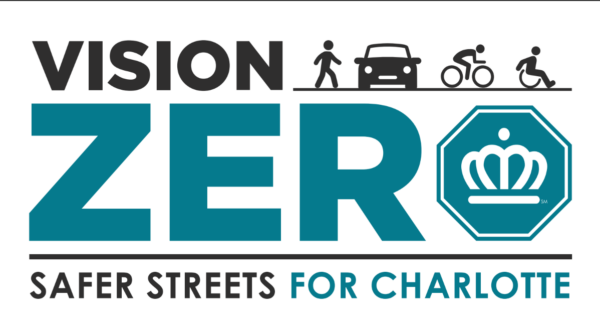Sustain Charlotte calls on city council not to abandon Vision Zero

The below is a letter from Sustain Charlotte executive director Shannon Binns to Charlotte City Council about discussions by the Transportation, Planning and Development Committee to potentially change the language in the city’s Vision Zero plan.
Dear Council Members,
During the Transportation, Planning, and Development Committee meeting on Feb. 5, committee members discussed changing the City’s Vision Zero goal. Vision Zero is a commitment to eliminate traffic fatalities and serious injuries. The proposal discussed was to replace the word eliminate with reduce. This change would nullify our commitment to this goal, and we would no longer qualify as a Vision Zero city. The zero in Vision Zero means zero.
In 2018, Charlotte City Council adopted a Vision Zero goal, joining the now more than 45 cities nationwide and many more worldwide that have also committed to eliminating traffic fatalities and serious injuries.
Vision Zero is also a goal of the Federal Highway Administration, which has a “vision of zero deaths … and growing a positive safety culture” across the country. They maintain a list of cities that have committed to Vision Zero and their Vision Zero Action Plans, including Charlotte’s.
After the Council adopted this goal in 2018, staff created a Vision Zero program, Vision Zero Task Force, and Vision Zero Action Plan. Funding to begin implementing the plan has come from the CIP budget.
In 2022, the Council reaffirmed this commitment to Vision Zero by adopting the Strategic Mobility Plan. In fact, the Strategic Mobility Plan highlights Vision Zero as one of the four main pillars of the plan.
Yet, the current plan is to reduce Vision Zero program funding from $13 million to $4 million for the next three bond cycles. Similar large funding reductions are planned for pedestrian infrastructure, and our bicycle infrastructure budget is too low to meet established goals. We cannot expect to make meaningful progress toward our goal of zero fatalities and serious injuries if we reduce our investment in these programs.
Weakening our goal from “eliminate” to “reduce” while also reducing funding for these programs that make our streets safer will not only reflect poorly on the City’s responsibility towards those who have lost their loved ones due to traffic violence, but also ensure more lives are needlessly lost.
And that number is growing. The number of people killed in vehicle-related incidents on Charlotte roads last year reached 70, an increase from 61 deaths in 2022.
A principle of Vision Zero is the understanding that all traffic fatalities and serious injuries are avoidable when actions are taken that prioritize safety over speed. In fact, Hoboken and Jersey City, New Jersey have set an example by achieving zero traffic-related deaths and serious injuries since establishing their Vision Zero goals.
Many other cities that committed to Vision Zero have dramatically reduced them and remain committed to eliminating them.
Rather than scaling back our ambitions and investments, let’s join these cities and take the steps needed to become a leader toward achieving Vision Zero. We know what needs to be done. Let’s do it.
Thank you for your service, and please reach out with any questions,
Shannon Binns
THANKS FOR READING!
As a nonprofit, community support is essential for us to keep doing what we do — including providing free articles like this. If you found this article helpful, please consider supporting Sustain Charlotte.
Want to stay in the loop? Subscribe to our weekly newsletter and follow us on Instagram, Facebook, and Twitter.
